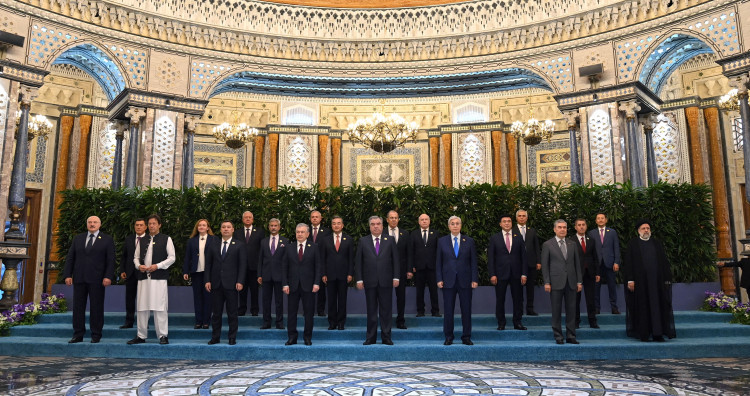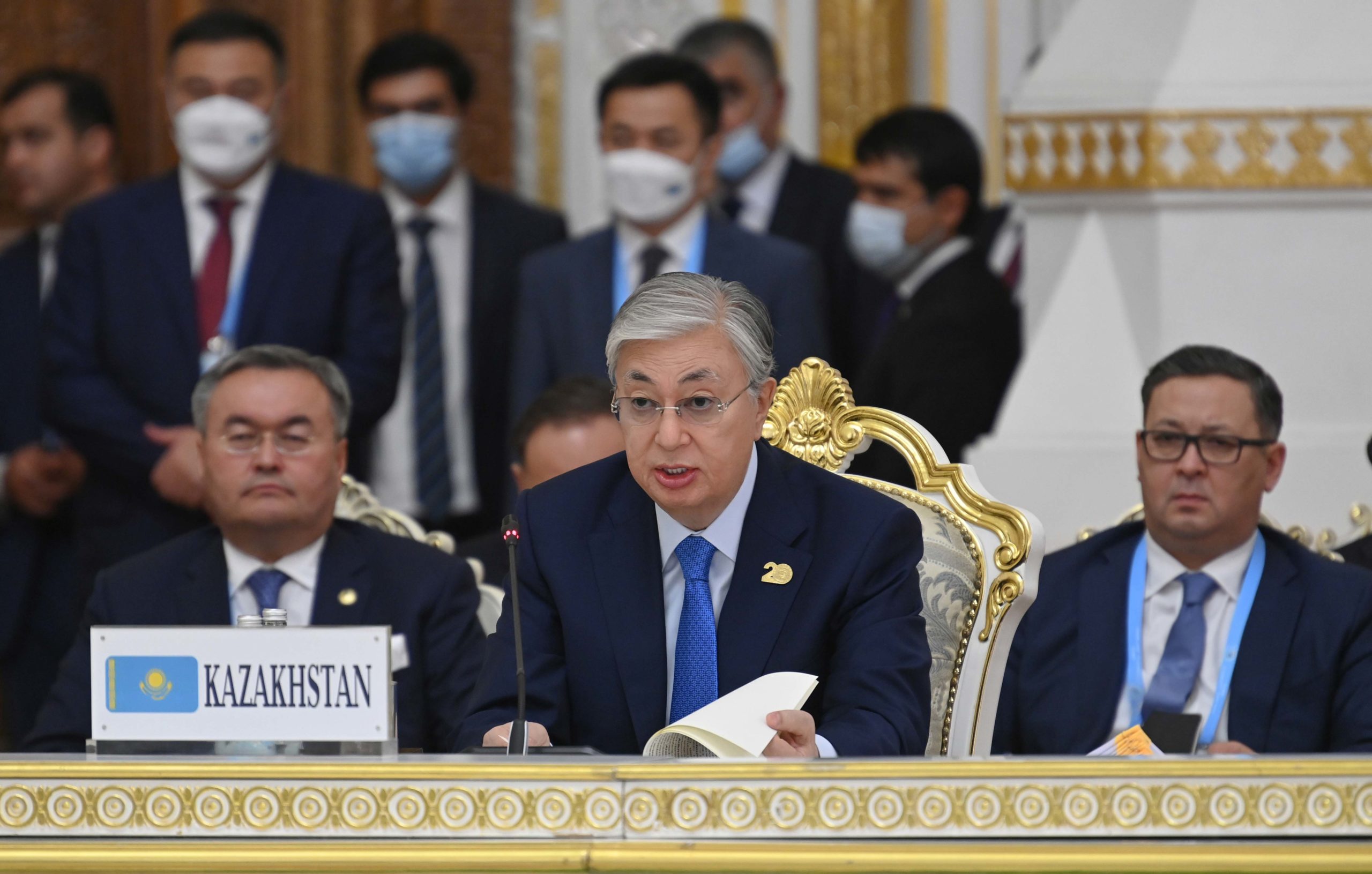NUR-SULTAN – President Kassym-Jomart Tokayev attended the Shanghai Cooperation Organization summit in Dushanbe on Sept. 17, reports the Akorda press service.

SCO meeting participants pose for a group photo. Photo credit: Akorda press service
“Thanks to joint efforts, the SCO has become the most successful and influential regional organization in the world. The SCO possesses vast demographic, financial, and natural resources, as well as powerful technological potential. It formed a solid legal base and effective mechanisms of interaction at all levels,” said Tokayev, calling the establishment of the SCO a “historic step”.
Founded in 2001, the SCO is an intergovernmental organization of eight states – China, India, Kazakhstan, Kyrgyzstan, Russia, Pakistan, Tajikistan, and Uzbekistan, four observer states – Afghanistan, Belarus, Iran, and Mongolia and six dialogue partners – Armenia, Azerbaijan, Cambodia, Nepal, Sri Lanka, and Turkey.
India and Pakistan joined the organization in 2017.
“The accession of India and Pakistan has undoubtedly strengthened SCO and made its activities truly trans-Eurasian in nature. The decision to admit Iran as a full member, and granting the status of dialogue partner to Egypt, Saudi Arabia, and Qatar give the Organization a new important dimension – the Middle East dimension,” said Tokayev.

President Tokayev during the meeting. Photo credit: Akorda press service
Tokayev also emphasized the collective spirit within the organization that brings together countries with “different models of development and different views on major issues of the world order,” but at the same time allows them to work together for the common good.
He said the SCO will remain an open and transparent structure, as it witnesses a new stage in its development.
“The destructive processes in the world have been intensified by the onset of the coronavirus pandemic, which has caused enormous damage not only to human health across the globe but also undermined the foundations of the global economic and political order,” he said.
Common challenges
Tokayev also spoke about the situation in Afghanistan, which, as he said, dramatically changed the regional landscape and increased the risks posed to neighboring countries.
This makes regional security even more relevant in the work of the organization. Part of this effort was the adoption of the SCO Program of Cooperation in countering terrorism, separatism, and extremism for 2022-2024.
Tokayev reaffirmed his country’s position on Afghanistan: that Kazakhstan sees Afghanistan’s future as a “truly independent and united state, living in peace with itself and its neighbors.”
“At this fateful and historic moment, the multi-ethnic people of Afghanistan should not be left alone in the face of unprecedented challenges. I believe that the SCO with its vast influence can and should play its active role in bringing peace and harmony to this country. Only by collective efforts can we ensure regional security against current threats,” he said.
Kazakhstan is ready to provide feasible assistance to solve urgent humanitarian and economic problems faced by Afghanistan. Among the proposed measures was the establishment of a SCO humanitarian hub in Almaty to deliver international aid to Afghanistan.
Tokayev also said Kazakhstan is ready to continue joint efforts to combat illicit drug trafficking, address cyber security, transnational crime, as well as to curb the spread of the coronavirus infection.
“A decisive breakthrough against the pandemic can only be achieved if there is a coordinated approach to mass immunization. Therefore, to speak with UN terms, we cannot afford to leave anyone behind. (…) I am convinced that accelerating the procedure of mutual recognition of vaccination passports in SCO countries and their integration into multilateral systems will help to overcome difficulties and challenges faced by our countries,” said Tokayev.
Prospects
While countries are trying to handle the consequences of the pandemic, it serves as a good opportunity to review the current state of affairs, analyze macro trends, and assess risks.
“I propose to instruct the Secretariat of the Organization together with the Consortium of SCO Economic Think Tanks to carry out this work and submit their thoughts by the next summit,” said Tokayev.
In his later remarks, Tokayev also spoke about the development of the stock market and financial technologies, the strategic vulnerability of maritime shipping, referring to the incident at Suez Canal back in March, and the transition to a green economy and sustainable development.
“We do not need big games in Eurasia, we need a big push to build a peaceful, secure and sustainable future for all. Our states have all the conditions for this – experience, mechanisms, infrastructure, and, most importantly, a common desire to build up our partnership and meet each other halfway. Our common goal is to transform the SCO region into a stable, economically developed, and prosperous macro-region,” said Tokayev, concluding his speech.
Chinese leader Xi Jinping and Indian Prime Minister Narendra Modi addressed the summit virtually.
While in Dushanbe, Tokayev also met with the President of Iran Ebrahim Raisi, and Pakistani Prime Minister Imran Khan.
